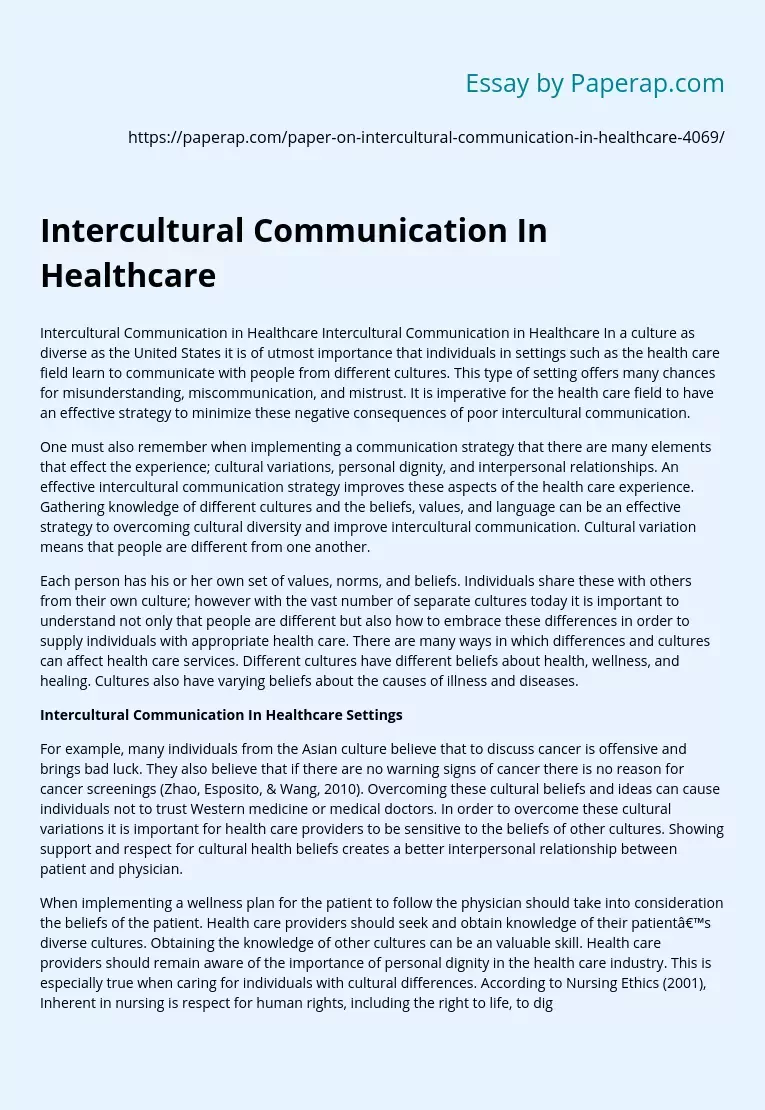Intercultural Communication In Healthcare
Intercultural Communication in Healthcare Intercultural Communication in Healthcare In a culture as diverse as the United States it is of utmost importance that individuals in settings such as the health care field learn to communicate with people from different cultures. This type of setting offers many chances for misunderstanding, miscommunication, and mistrust. It is imperative for the health care field to have an effective strategy to minimize these negative consequences of poor intercultural communication.
One must also remember when implementing a communication strategy that there are many elements that effect the experience; cultural variations, personal dignity, and interpersonal relationships.
An effective intercultural communication strategy improves these aspects of the health care experience. Gathering knowledge of different cultures and the beliefs, values, and language can be an effective strategy to overcoming cultural diversity and improve intercultural communication. Cultural variation means that people are different from one another.
Each person has his or her own set of values, norms, and beliefs. Individuals share these with others from their own culture; however with the vast number of separate cultures today it is important to understand not only that people are different but also how to embrace these differences in order to supply individuals with appropriate health care.
There are many ways in which differences and cultures can affect health care services. Different cultures have different beliefs about health, wellness, and healing. Cultures also have varying beliefs about the causes of illness and diseases.
Intercultural Communication In Healthcare Settings
For example, many individuals from the Asian culture believe that to discuss cancer is offensive and brings bad luck.
They also believe that if there are no warning signs of cancer there is no reason for cancer screenings (Zhao, Esposito, & Wang, 2010). Overcoming these cultural beliefs and ideas can cause individuals not to trust Western medicine or medical doctors. In order to overcome these cultural variations it is important for health care providers to be sensitive to the beliefs of other cultures. Showing support and respect for cultural health beliefs creates a better interpersonal relationship between patient and physician.
When implementing a wellness plan for the patient to follow the physician should take into consideration the beliefs of the patient. Health care providers should seek and obtain knowledge of their patient’s diverse cultures. Obtaining the knowledge of other cultures can be an valuable skill. Health care providers should remain aware of the importance of personal dignity in the health care industry. This is especially true when caring for individuals with cultural differences. According to Nursing Ethics (2001), Inherent in nursing is respect for human rights, including the right to life, to dignity and to be treated with respect.
Nursing care is unrestricted by considerations of age, colour, creed, culture, disability or illness, gender, nationality, politics, race or social status. (p. 375). Treating others with respect and dignity can not only improve the interpersonal relationship between patient and provider, it can also lead to a better patient compliance with physicians orders. A patient who is resentful of perceived or real lack of respect by his or her health care provider is less likely to follow the physician’s instructions. Dignity plays an important role in the health care experience.
In today’s world of cultural diversity, knowledge is a valuable resource. With individuals from different areas and countries seeking health care in the United States one valuable strategy to improve interpersonal relationships is for the provider, nurse, or another individual in the office or hospital to speak different languages. For example, a patient who comes into the hospital does not speak English. The patient can be scared, confused, worried, and anxious. If they are not able to understand the physician or explain their concerns or complaint to the physician or nurse, misunderstandings, confusion, and misdiagnosis can occur.
If there is no bilingual staff member, an interpreter should be available to aid in translating for both the patient and physician. When a patient can understand the physicians and nurses questions about their situation and the patient can explain their signs and symptoms the interpersonal relationship is strengthened and trust can be created. By obtaining knowledge of other cultures beliefs, how they value medicine, beliefs about the cause and treatment of disease, and knowledge or availability to understand different languages the health care provider can create an atmosphere of trust with their patient.
When treated with dignity, respect, and genuine concern, a patient from a different culture will be more likely to be more open with his or her provider, follow the physician’s follow-up instructions and care plan, and maintain a positive interpersonal relationship with their physician. According to Jordan (2009) “Cultural competence is key to the delivery of the highest quality health care; it is intrinsically tied to our ability to understand and effectively address the cultural and linguistic needs of our patients and families” (p. 8). Reference Codes and Declarations. (2001). Nursing Ethics, 8(4), 375-379. Retrieved from EBSCOhost. Jordan, T. (2009). Diversity vs. Inclusion. INSIGHT into Diversity, 19. Retrieved from EBSCOhost. Zhao, M. , Esposito, N. , & Wang, K. (2010). Cultural beliefs and attitudes toward health and health care among Asian-born women in the United States. JOGNN: Journal of Obstetric, Gynecologic & Neonatal Nursing, 39(4), 370-385. doi:10. 1111/j. 1552-6909. 2010. 01151. x
Intercultural Communication In Healthcare. (2019, Dec 05). Retrieved from https://paperap.com/paper-on-intercultural-communication-in-healthcare-4069/

